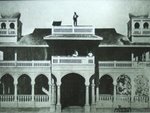[The Oxford Business Group reported on 30th March 2010 the following:]
Brunei Darussalam: A Class Act
30 March 2010
Brunei Darussalam is looking to add another layer to its already highly developed education system, with authorities considering plans to put in place a structured preschool network that would serve as a foundation for subsequent learning.
Education is one of the single biggest line items in the state budget, behind only defence and security and infrastructure investments in terms of allocations. On March 15, the Ministry of Finance unveiled its draft 2010-11 budget, with the Ministry of Education's slice being set at almost $450m out of total projected spending of $3.5bn.
Most indicators suggest that it is money well spent. The Sultanate's existing education system is already rated as meeting extremely high standards, with the World Economic Forum's most recent Global Competitiveness Index ranking Brunei Darussalam third overall among the member states of the Association of South-east Asian Nations.
With more than 25% of the country's population of some 400,000 enrolled in some form of educational activity, Brunei Darussalam already has an extremely high learning participation rate, one that may climb still further if officials follow through with the proposal to extend the formal schools system to the preschool level.
Currently, there are some 40,000 children in the five-year-old and under bracket, while the public education system only begins to provide schooling for children aged five and above.
While there are more than 15 nurseries and kindergartens already operating in Brunei Darussalam, with other schools offering preschool teaching alongside other levels of education, these facilities are privately run and have little direct input from the state in terms of curriculum. This is a situation that Hj Suhaila Hj Abd Karim, the deputy permanent secretary for core education at the Ministry of Education (MoE), believes must change.
In order to formalise the provision of preschool learning, ministry officials will be holding a series of meetings with relevant agencies and service providers to discuss the present situation, he said on March 1.
Speaking at the opening of a ministry-sponsored workshop entitled "Enhancing High Quality Early Childhood Educators", Hj Suhaila said that preschools should serve to help young children acquire basic communication, social and other positive skills in preparation for primary school.
While not yet in the business of providing preschool education, the MoE does educate those who do, with the Sultan Hassanal Bolkiah Institute of Education, a faculty within the Universiti Brunei Darussalam, offering initial teacher training as well as in-service programmes.
"Effective teaching methods and teachers' commitment greatly helps to determine how successfully we manage to instil values, skills and attitudes," said Hj Suhaila. "Innovative teaching promotes pupil creativity and develops a learning environment that invites intrinsic motivation in today's children."
According to Hjh Siti Aisah Hj Mohd Ali, the acting director of the MoE's Human Resource Development Division, creating a high-quality early education system represented an efficient use of funds, as it would be an investment in the future. By developing a preschool network, Brunei Darussalam could begin a nurturing process of a skilled workforce that would keep the country competitive in the global economy. "I am sure that by providing a solid early learning foundation, it will help our children succeed later in school, while at the same time giving them an equal opportunity to succeed in life," Hjh Siti Aisah told delegates attending the same seminar.
Though the state is keen to expand its role in early education from a regulatory one to encompass the provision of formal teaching, there is as yet no clear timeline for such a move. Nor, at this stage of the scheme, has there been any firm indication as to how the extensive private sector preschool network will fit into any new early education system.
Should the state follow through with its proposals, a public preschool programme could affect the private sector's operations, by draining off students from the fee-paying centres to MoE schools, which most likely will be free of charge, as is the case for primary schools operated by the ministry. However, these are issues that will be addressed in the discussions flagged by Hj Suhaila.
By putting in place a new rung on the country's educational ladder, Brunei Darussalam will not only be rounding off its school system, it will also be providing additional employment opportunities for teachers and strengthening the foundation of the Sultanate's future.
Welcome to my private journal generally on Brunei issues. Any opinions expressed are in my personal capacity. All rights to the articles are reserved.
Wednesday, March 31, 2010
Subscribe to:
Posts (Atom)











